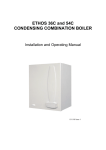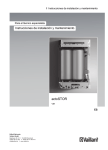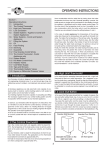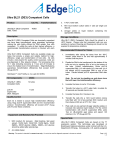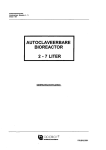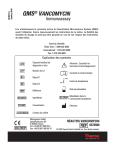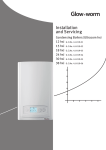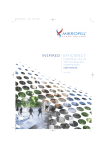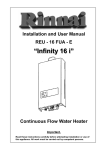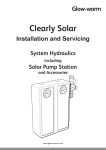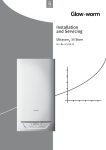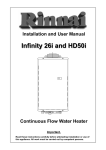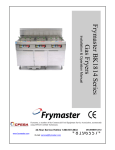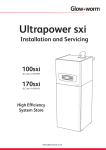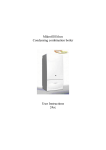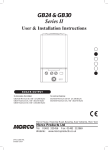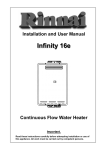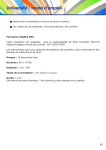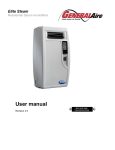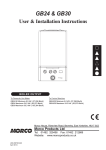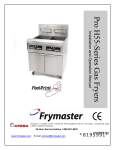Download Ethos 45SD Technical Documentation
Transcript
ETHOS 30 SD & 45 SD CONDENSING BOILERS Installation and Operating Manual Issue 01/07 Combustion fan CONTENTS 1 1.1 1.2 SAFETY GUIDELINES .............................1 Conditions .....................................................1 General guidelines.........................................1 2 2.1 2.2 2.3 2.4 2.5 2.6 2.7 2.8 2.9 2.10 2.11 TECHNICAL DATA ...................................2 Front view .....................................................2 Description of components............................3 Technical data................................................4 Introduction...................................................5 Operation of the ETHOS Boiler ....................5 Methods of control ........................................5 Combustion products ....................................5 .............................................5 Circulation pump...........................................5 Description of appliance ...............................5 Ethos SD........................................................5 3 3.1 3.2 3.3 3.4 3.5 3.6 3.7 INSTALLATION.........................................6 Unpacking .....................................................6 Selecting a location in the property ...............6 Suspending the appliance..............................6 Flue System...................................................7 Supply and discharge system ........................7 Influence of flue system on heat input ..........7 Classification according to evacuation of combustion products .....................................8 Ethos resistance table ....................................9 Condensate discharge..................................10 CH and DHW circuit...................................10 Attention! Important....................................10 CH circuit....................................................10 Expansion Vessel.........................................10 Main Cold Water Inlet.................................10 Pump circuit ................................................11 Circulation pump.........................................11 Frost protection ...........................................11 Connecting the gas pipe ..............................11 3.8 3.9 3.10 3.10.1 3.10.2 3.10.3 3.10.4 3.11 3.11.1 3.12 3.13 4 4.1 4.2 4.3 ASSEMBLY INSTRUCTIONS FOR ELECTRICIAN ........................................12 Mains connection ........................................12 Terminal block connections ........................12 Wiring diagram ...........................................13 5 5.1 5.2 5.2.1 OPERATION.............................................14 Display ........................................................14 Diagnosis mode display ..............................14 Control buttons............................................14 5.3 5.4 5.5 5.5.1 5.7 5.7.1 5.7.2 5.8 5.8.1 5.8.2 5.8.3 5.8.4 5.9 5.10 5.11 Sensors ........................................................15 Installer programme ....................................17 Explanation of options for installer.............17 Programme number J1: Max. CH supply temperature .................................................17 Programme number J2: Max. CH heat output (fan speed during CH mode) .......................17 Programme number J3: Pump operation .....17 Programme number J4: Pump CH overrun time .............................................................17 Programme number J5: Pump DHW overrun time .............................................................17 Programme number J6: Step modulation Control ........................................................18 Programme number J7: Hot water temperature .................................................18 Programme number J8: Max. DHW output 19 Filling and bleeding the boiler and installation...................................................19 Starting the appliance..................................21 General........................................................21 First commissioning ....................................21 Heat input adjustment and setting ...............21 Max. heat input setting................................21 CO2 settings..............................................21 Checking the max CH input........................21 Min. input setting ........................................22 Conversion for different gas type................22 DHW temperature .......................................22 Shutting down .............................................22 6 6.1 6.2 FAILURES.................................................23 Cause of failure ...........................................24 Table of solutions ........................................26 7 7.1 7.2 7.3 MAINTENANCE ......................................28 General........................................................28 Inspection....................................................28 Maintenance................................................29 8 USER INSTRUCTIONS...........................30 9 EXPLODED VIEW ..................................31 10 PARTS LIST..............................................32 11 BENCHMARK commissioning checklist…34 5.5.2 5.5.3 5.5.4 5.5.5 5.5.6 5.5.7 5.5.8 5.6 Only original ETHOS parts must be used for service purposes. Page 1 1 SAFETY GUIDELINES 1.1 Conditions ETHOS BOILERS shall not be liable for any damages caused by non-compliance with the assembly instructions and hence strongly recommend that these installation instructions are studied carefully. Only original ETHOS parts must be used for services purposes. 1.2 General guidelines It is a statutory requirement that all gas appliances are installed in accordance with the manufactures instructions and all current regulations in force, all instructions should be fully read before installing or using the appliance. All installations should be carried out by competent persons as described in the Gas Safety (Installation & Use) Regulations. i.e. CORGI registered and holding current certification. The work must be carried out by a competent person as described in the I.S. 813 Domestic Gas Installations with reference to the following codes of practices. The Manufacturers instructions MUST NOT be taken in any way as overriding statutory obligations. This boiler has been tested and certified to comply with all necessary European directives, latest building regulations and efficiency requirements for the SEDBUK scheme and as been approved with an efficiency band rating of A and is CE marked and complies with 92/42/EEC Efficiency of Hot Water Boilers Directive 90/396/EEC Gas Appliance Directive 93/68/EEC Low Voltage Directive (was 73/23) 92/31/EEC Electromagnetic compatibility Directive I.S. 813 Domestic Gas Installations The boiler should be installed in compliance with The building regulations (Scotland-consolidated) Building Regulations (Northern Ireland) Building Regulations Water fittings regulations or water bylaws in Scotland The boiler should not be modified in any way. Any modifications will invalidate the gas approval and invalidate the warranty. Codes of Practice BS 7593:1992 Treatment of water in domestic hot water central heating systems BS5546:1990 installation of hat water supplies for domestic purposes BS5440 part 1: 2000 flues BS5440 part 2: 2000 Ventilation BS5449:1990 Forced circulation hot water systems BS6798:2000 installation of gas fired hot water boilers of rated inputs not exceeding 70kW BS6891:1989 Installation of low pressure gas pipe up to 28mm BS7671:2001 IEE wiring regulations BS4814:1990 Specification for expansion vessels BS5482:1994 installation of LPG BS7671 requirements for electrical installations BS5955 -8 plastic pipe work installations ATTENTION: High Voltage Before opening the boiler casing for maintenance or servicing the 230VAC main supply to the boiler must be disconnected!! Page 2 2 TECHNICAL DATA 2.1 Front view 452 120 120 106 12 11 13 50 552 57 10 350 125 106 100 50 50 89 37 55 126 1+8 2 3 4 5 67 9 Figure 1 Dimensional sketch of CH boiler connections 1 = Condensate Trap 2 = CH Flow connection 22mm 3 = Gas connection 15mm 4 = DHW cylinder return 22mm 5 = CH return connection 15mm 6 = Drain Cock 7 = Pressure gauge 8 = Condensate discharge 9 = Cable glands (3x) 10 = Air supply (alternative 80mm 2 pipe) 11 = Air supply, concentric 12 = Flue discharge 13 = Air supply (alternative 80mm 2 pipe) Page 3 2.2 Explanation of parts 1 2 3 4 5 6 7 8 9 Concentric terminal 1 2 3 4 5 6 7 8 9 = heat exchanger air vent = high limit thermostat = supply sensor = heat exchanger = fan = air vent = circulation pump = gas control valve = condensate trap Condensate discharge CH return DHW cylinder return Gas CH flow Condensate trap Page 4 2.3 Technical data General EC product ID number Dimensions (HxWxD) Category Type of appliance CH water content of appliance Weight (empty) CH supply/return connections DHW cylinder return connection Gas connections Flue connection Air supply Concentric Power consumption Power consumption, partial heat input Power consumption, standby IP-classification Central heating Nominal Heat Input (net) Nominal Heat Input (gross) Max. gas consumption Efficiency at 50/30°C, full heat input Efficiency at 50/30°C, partial heat input Nominal heat output at 80/60°C Nominal heat output at 50/30°C Sedbuk rating NOx-emission CO- emission Technical data Max. flue gas volume Boiler class (evacuation /air supply) Flue gas CO2 content Flue gas dew point Flue temperature at 80/60°C (at ambient temperature of 20°C) Flue material temperature class Permitted maximum resistance of flue system * Condensation pH value Available CH pump pressure at ∆T20°C (in meter Water Gauge) Max. CH supply temperature CH water pressure (min./max.) NOx class Required gas pressure (Natural Gas G20 ) ( LPG G31) mm litre kg mm mm mm mm mm mm W W W kW kW m³/hr % % KW KW mg/kWh mg/kWh m3/hr % °C °C Pa MWG °C Bar mbar mbar CE 0063 BQ 3034 (2005) 550 x 450 x 350 II2L3P Ethos 45SD Ethos 30SD 2,1 30 22 22 15 80 80 80/125 180 100 5 IP44 2,7 32 22 22 15 80 80 80/125 200 135 5 IP44 6,6 – 28,5 7,3 – 31,7 3,0 105,0 108,1 6,3 – 27,6 7,1 – 29,9 A <15 <20 9,9 – 42,5 11,0 – 47,2 4,5 105,4 108,5 9,6– 41,1 10,7– 44,8 A <15 <20 60,0 40,0 B23, C13, C33, C43, C53, C63, C83 9 52 75 T 120 150* 4 tot 5,5 2,0 1,5 90 0,5 – 3 5 5 10 - 25 30 - 50 Table 1 Specifications * With this resistance value the heat output will remain within the specifications indicated on the data plate; if the . resistance is higher, the heat output will drop, see par3.6 Installation and Operation manual ETHOS 36C and ETHOS 54C –1206/06 Issue 2 Page 5 2.4 Introduction This Installation and Operating manual is for the installer and the user of the ETHOS boiler. It contains essential information for installing and adjusting ETHOS boilers. We recommend that you first consult this installation manual, to ensure that the installation is carried out correctly. In addition, it is required that the end user of the boiler be fully instructed on its operation, and that the installation and operation manual be left near the boiler to make it immediately available for later use, if necessary. 2.5 Operation of ETHOS Boiler This ETHOS; is a high efficiency, condensing, boiler. Flue gases are cooled below condensation point by a Spiranox heat exchanger made of stainless steel. This recovers additional heat which will contribute to the boiler efficiency, which is in excess of 107%. The European calculation method assumes 100% efficiency for appliances which do not condense and efficiencies higher than 100% for condensing appliances. Since flue gases are very low in temperature (lower than 75°C), a stainless steel or PP plastic approved flue pipe must be used. The appliance is manufactured in according with the European approved requirements (EC) and has the following Dutch Gastec Gaskeur quality marks: Clean combustion (SV) – 107% High Efficiency (HR) – Comfort Hot Water (CW) –,High Efficiency Hot Water (HRww) and – Solar Boiler Reheater (NZ). 2.6 Control The boiler can be controlled using a conventional volt free time clock, room thermostat or by a modulating ‘OpenTherm’ control. The boiler is fully modulating and accurately balances heat output to the load of the property and for the hot water production demand. 2.7 Combustion products Due to the modulating premix burner, the combustion complies with the strictest European standards. 2.8 Combustion fan A speed-controlled fan is used to reduce power consumption: when the heat requirement is low, the fan will rotate more slowly, resulting in lower power consumption. 2.9 Circulation pump The appliance has a pump with speed switch which should be set at speed III 2.10 Description of appliance The appliance is a ccondensing gas system boiler suitable for both domestic and commercial Central Heating installations. The boilers are range rated. The heat output can be set and adjusted to the requested heat output of the central heating. 2.11 Ethos This appliances are heating only boilers with an integral 3 way valve and control unit including connections for a Rapide DHW cylinder. Page 6 3 INSTALLATION 246 246 552 3.1 Unpacking This appliance is supplied with: − Installation and Operating manual; − a user manual with warranty card; − a air vent key; − a hanging bracket; − Condensation trap with condensate discharge hose. Check the appliance immediately on receipt. Any damages must be reported to the supplier immediately. All appliances are completely assembled. Ethos condensing boilers are adapted to natural gas G20 3.2 Selecting a location in the property. The front and bottom side of the appliance have to be accessible for maintenance and service. 20 452 20 Figure 2 Dimensional sketch of clearances Both sides must be placed at least 20 mm from the wall or cabinet wall. 452 226 170 226 170 12,5 57 The following facilities must be present and readilty available: a) A permanent 230 volt single phase power supply with the boiler being protected by a double pole switch with minimum openings of 3mm and fused at 3 amp. b) Drain connection suitable for condensate discharge. c) Wall which can support the boiler weight. 8x15 Ø8 8x15 552 The assembly location should be dry and protected from adverse weather conditions such as frost and freezing. The appliance has a built-in fan which will causes low levels of noise depending on the load: choose a location in the property where this sound production will not cause nuisance, preferably against a brick wall. 12,5 3.3 Suspending the appliance Mark off the holes for the hanging bracket and determine the location for connecting the supply and discharge pipes. Figure 3 Dimensional sketch of wall bracket Page 7 3.4 Flue System General Air supply material: PP plastic or stainless steel Flue discharge material: plastic (temperature resistant up to 120° C, air flushed) or stainless steel with sealed joints. Attention! First connect all pipework and flue pipes, fill up and vent the installation before commissioning the boiler. The high flue gas temperature protection for plastic discharge material is built into the boiler as a safety feature. This protection cuts off the gas supply as soon as the preset maximum flue temperature is exceeded, after which the appliance is interlocked and error code 't0' starts to flash. There are two types of connections • Concentric connection (80mm / 125mm with one pipe inside the other) • Two Pipe system (80mm air intake with a separate 80mm Flue outlet) Concentric connection (standard) The concentric connection kit is standard: diameter air supply pipe 125 mm and flue pipe 80 mm. Always ensure that the grey plastic adaptor is sited in the flue connection correctly before installing the connecting flue pipework Two Pipe System (optional) The optional connection for air supply and flue pipes is suited to a stainless steel or plastic discharge system. The connection diameter for the flue pipe is 80 mm and for the air supply pipe also 80 mm. The air supply pipe can be placed on the left or right side of the flue pipe by moving the connection sockets. 3.5 Supply and discharge system The Ethos boiler is a room sealed appliance with the air needed for combustion being drawn in from outside. The casing jacket is sealed airtight to the back plate, so the air can only be supplied through the air supply pipe. Therefore, always make sure that the front door is correctly fitted on the appliance when the boiler is operating. Attention! Note that any horizontal flue pipe must incorporate a fall sloped back toward the boiler at a rate of 10mm per 1 metre. If not,condensation can accumulate in the flue pipe, and may result in water damage to the boiler. 3.6 Influence of flue system on heat input The diagram shows the ratio between the kW input and the flue systems resistance. For the maximum Boiler output a maximum resistance of 150 Pa or less is required. Should the flue resistance be more than 150Pa the boilers output will be reduced; for further information contact the technical department. 60 DHW heat input (Net) [kW] CH heat input (Net) [kW] 55 50 45 30SD 40 45SD 35 30 25 20 0 50 100 150 200 250 300 Pressure drop [Pa] 350 400 450 500 Diagram 1 influence of pressure loss on heat input Page 8 3.7 Class B23 C13 C33 C43 C53 Classification according to evacuation of combustion products System description • Non-room sealed application; flue connected to outside but combustion air is being drawn directly from room where boiler is installed. • Room sealed premix appliance with horizontal outlet • Air intake and flue gas discharge through concentric exterior wall terminal • Room sealed premix appliance with vertical outlet terminal • Air intake and flue gas discharge through concentric exterior roof terminal • Room sealed premix appliance with collective supply and discharge • Comments: • Appliance complies with Class C • Max. back pressure 1mbar (100Pa) • • • Type exterior wall duct Max. resistance 150 Pa Ducts sloped to drain toward boiler (1cm/m) • • Type roof duct Max. resistance 150Pa • • • Room sealed premix appliance with separate • supply from exterior wall and separate discharge through roof • • • • C63 • C83 • Room sealed premix appliance with separate • approved and marketed system • Room sealed premix appliance with separate • supply from exterior wall and collective • discharge • Vertical terminal Max. resistance 150Pa Ducts sloped to drain toward boiler (1cm/m) Collective discharge with under pressure Air terminal not provided by boiler manufacturer Roof terminal not provided by boiler manufacturer Max. resistance 150Pa Ducts sloped to drain toward boiler (1cm/m) Supply and discharge to be installed on the same side of the building Only connect to UK approved discharge material Max resistance 150Pa Type exterior wall duct not provided Max. resistance 150Pa Ducts sloped to drain toward boiler (1cm/m) Horizontal terminaL Page 9 3.8 Ethos resistance table By using different flue installations, either concentric or the 2 pipe system different flue lengths can be achieved, Up to a resistance of 150 Pa. At this pressure the heat input will be equal (±5%) to the heat input specified on the data plate of the appliance. When a concentric system is used, its length should not exceed 12 meters, this is not due to resistance but to the preheating of the combustion air. Concentric Flue System Part (mm) Component Resistances [Pa] ETHOS 30SD ETHOS 45SD Vertical Terminal Horizontal Terminal straight pipe/m 45° bend 90° bend 80/125 80/125 80/125 80/125 80/125 12 23 3,4 2,6 3,9 26 50 7,4 5,7 8,5 80 1,1 2,3 45° bend R=0,5D 80 1,3 2,8 90° bend R=1,0D 80 2,1 4,5 80 80 80 12 36 1,4 26 50 2,9 45° bend R=0,5D 80 1,6 3,5 90° bend R=1,0D 80 2,5 5,4 Two Pipe System Air Inlet Part straight pipe/m Flue Gas Outlet Vertical terminal Horizontal terminal straight pipe/m Table 3 Flue discharge resistance Example of calculation boiler type: Ethos 45SD Concentric pipe 80/125mm vertical 5m + horizontal 1m=total 6m concentric straight pipe 2x Concentric 90° bend ; 2x Concentric 45° bend ; Vertical terminal 80/125. Concentric pipe 80/125: 6m Concentric 90° bends : 1 pieces Concentric 45° bends : 2 pieces Vertical terminal 80/125 Total Resistance 6 x 7,4 1 x 8,5 2 x 5,7 Resistance 44,4 Pa 8,5 Pa 11,4 Pa 26,0 Pa 90,3 Pa Total resistance is 90,3 Pa, so the boiler output is not changed by the resistance (lower than 150 Pa) and total concentric length is less than maximum allowed 12 metres. Page 10 3.9 Condensate discharge The condensate discharge must be installed during the assembly. Install the condensate discharge as follows: Slide the supplied cup bottle trap over the two condensate hoses under the boiler, so the arrows are facing each other. Then push the cup against the bottom of the boiler. Turn the trap in position until the condensate discharge faces the desired direction. Attach the condensate discharge hose to the trap with a plastic swivel and seal. The connection is linked to a suitable drain via the flexible hose. Only use plastic parts for the condensation discharge. Metal pipes will corrode and are not acceptable. Attention! If this discharge is blocked, the appliance may be damaged. 3.10 CH and DHW circuit Figure 4 CH boiler piping connections = 3.10.1 Attention! Important If plastic central heating pipe is used on the system, it should be barrier protected against oxygen diffusion. On existing installations, the system should be fully cleaned and flushed, with a suitable strainer being installed in the return pipe work before being connected to the boiler. 3.10.2 CH circuit The feed and return connections are based on connecting the installation by using compression fittings. These connections are located at the bottom of the appliance. It is essential to install the isolation valves which are suppiled. The appliance has a drain cock at the bottom, so it can be easily drained. 2 1 = 3 4 5 9 6 1= Condensate trap 2= CH & DHW primary flow 3= Gas 4= DHW primary return 5= CH return 6= Drain Cock 7= Pressure gauge 8= Cable glands 3 x 9= Condensate trap outlet ATTENTION ! ( Safety Relief Valve ) The appliance is not equipped with a prefitted pressure relief valve; A suitable valve with a max. 3 bar setting must be installed in the installation's pipe work, in the immediate vicinity of the appliance. ATTENTION ! ( System Bypass ) The appliance is not equipped with an internal bypass. A suitable automatic bypass valve should be fitted in accordance with current regulations, and at such a distance from the boiler as to allow suitable flow rates. Before the installation is operated for the first time, it must be thoroughly flushed and treated with suitable system cleaners and inhibiters. 3.10.3 ATTENTION ! ( Expansion Vessel ) The boiler is not fitted with an internal expansion vessel; so an expansion vessel should be sized to suit the volume of water in the central heating installation and static pressure. The expansion vessel should be connected to the return pipe work. Please contact our technical department for advise on expansionvessel sizing. 8 7 Page 11 3.11 Pump circuit Depending on the boiler version, several types of pumps can be found inside the appliance; a built-in Grundfos UPS 15-60 HB pump(Ethos 30 SD only) or a Grundfos UPS 15-70 HB pump (Ethos 45SD only). 3.11.1 Circulating pump The pump has a speed switch which is factory-adjusted to the highest position. Position Attention! The pump speed should not be adjusted The appliance has a built-in pump overrun timer. Ι ΙΙ ΙΙΙ Ethos 30SD X Right Right Ethos 45SD X X Right 3.12 Frost protection The boiler has a built-in frost protection for activating the central heating pump when the boiler water temperature is 8°C. When the boiler water temperature is 5°C, it will also ignite the burner until the supply temperature is 10°C. Attention! Any other parts of the installation that may be subjected to frost or freezing should have additional protection fitted. 3.13 Connecting the gas pipe At the planning stages it may be necessary to contact the local gas supplier to ensure an adequate supply of gas is available. An existing service pipe must not be used without first contacting the local gas supplier. All gas pipe work should be installed by a competent person and in accordance with all current standards and regulations. The boilers gas pipe should be calculated and sized to supply adequate gas working inlet pressure of 20mbar (minimum) for natural gas and 30mbar (minimum) for LPG. All gas pipe work should be tested for gas tightness. Installation and Operation manual ETHOS 36C and ETHOS 54C –1206/06 Issue 2 Page 12 4 ASSEMBLY INSTRUCTIONS FOR ELECTRICIAN 4.1 Mains connection The boiler requires an earthed 230 volt 50 Hz single phase supply and must be connected in accordance with all current regulations and requirements. A permanent supply to the boiler is needed at all times to the boiler, which should be protected by a maximum 3 Amp double-poled isolator with at least 3mm of contact separation on both poles. The single phase cable colour coding should be wired correctly, although the boiler is not polarity sensitive All control switching is volt free. ATTENTION! AT NO TIME SHOULD 230 VOLT BE USED TO SWITCH THE BOILER. PC COM Cylinder Sensor Outside Sensor Timeclock or room thermostat Terminal block connections Opentherm control 4.2 12345678 PE N L FUSE 2AT CODE KEY N L ALARM Figure 6 Electric terminals The following parts can be connected to the terminal block, see illustration PC COM 1-2 3-4. 5-6. 7-8 PE. N. L CODE KEY ALARM PC communication. The manufacturer can use this connection for reading-out or modifying data or settings by using a PC and connecting cable. OpenTherm control. Can be used to fully modulate the boiler. On/off room thermostat / time clock. For connecting clock or conventional room thermostats. The heat acceleration element of the on/off thermostat must be set at 0.12A; the max. permissible resistance of the room thermostat circuit should not exceed 10 ohm. Attention! Do not connect an OpenTherm control to this terminal. Outside temperature sensor. If an OpenTherm control with weather dependent control is used, the outside temperature sensor must be connected to terminals 5 and 6. The OpenTherm control contains the settings for weather dependent control. External DHW cylinder. The external water heater can be connected to the boiler with a sensor (NTC) or thermostat; if a sensor is used, the boiler display can show the water heater temperature. Only applicable for Ethos …SD boilers Power supply connection 230V. Connection for earthed cable. PE= earth N= Neutral L= phase 230V 50Hz Code key. A code key is a small PCB which contains the settings per boiler type. When the burner control unit is replaced, the code key must be installed in the new burner control unit. External failures. This connection can be used for showing external messages by using a relay on terminals 1 and 3. A LED can be connected to terminals 2 and 3. Table 4 Explanation of electrical connections Page 13 Wiring diagram See Diagram 4.2 4.3 Page 14 5 OPERATION 5.1 Display The display has two digits, which indicate the supply temperature of the central heating water in the boiler: By pressing the Info button, the operating status can be displayed. If the Info button is pressed twice, the display will show the water temperature of the central heating water. If the display shows a code that starts with a (t), the boiler will temporarily shut down, except for code t4 and t5. If these are active, the boiler will run an emergency programme. If a (t) condition is automatically restored, the boiler will operate normally again. .0 Standby .2 Fan start .3 Fan pre-purge .4 Ignition .5 CH mode heat demand or CH pump overrun .6 DHW operation .7 DHW preheating or DHW pump overrun t0 High limit thermostat >opened 30sec. t1 Supply temperature too high during CH demand or anti-recycle timer t2 Supply temperature too high during hot water mode t3 Hot water temperature too high t4 Supply sensor interrupted / short-circuited t5 N/A t7 Room thermostat anti-recycle timer active t8 Vent programme active t9 VKK check error None UK code tc Temperature Delta-T during start too low Figure 1 Display 5.2 Diagnosis mode display In this menu various current settings and the last 10 failures or interlocks can be consulted, without using a laptop. If no failures are saved in the burner control unit memory, the display shows ’- -’. By pressing the ’-’ button (approx. 1 sec.), the diagnostic menu is shown. By pressing the Info button, the following information is shown: D1 = current supply temperature D2 = domestic hot water temperature D3 = N/A D4 = outside temperature D5 = N/A D6 = pump on 1 /pump off 0 D7 = three-way valve position C = CH / T = DHW D8 = ionisation current (micro Amp) D9 = not active E0 = --last failure … E1--E9= other stored failures 5.2.1 Control buttons These buttons give access to different options for adjusting and checking the appliance; by pressing a button or a combination of buttons, the following functions can be performed: 1. Switching DHW production on or off By pressing the ’+’ button (3 sec.), the DHW function can be activated. H1/ - - alternately shown on display: DHW is switched off. H1/ t a alternately shown on display: DHW is switched on. By pressing the Info button again, a selection can be made between the Eco or Comfort mode for keeping the internal DHW heat exchanger warm. Page 15 2. Installer menu: To access the Installer menu. First press the ’-’ and ’Info’ buttons simultaneously (3 sec.). After pressing these buttons, the window will show a ’0’. Then enter code ’8’ by using the ’+’ or ’-’ buttons and press the Info button to access the Installer menu (see 5.4 Installer programme). Exit this Installer menu by pressing the Info button until the display shows the central heating water temperature. Then the modified parameters will be automatically saved. If you do not wish to save the modifications, wait 1 minute and you will automatically exit this service menu without saving the modified settings. 3. Adjusting the gas valve: Pressing the ’–’ and ’+’ buttons simultaneously (3 sec.) = Gas valve adjusting mode for 20 minutes, (display shows an ’H’ or ’L’). By pressing the ’+’ or ’–’ buttons again, the high and low setting speeds can be accessed. The display alternately shows the speed in thousandths (Ethos 30SD= H 6000/6.0 rpm L 1500/1.5 rpm Ethos 45SD= H 6000/6.0 rpm L 1650/1.6 rpm) and an ’H’ for max CH output. The display alternately shows an ’L’ and e.g.1.5 (1,500 rpm) for the minimum CH output. Cancel the gas valve adjusting mode by simultaneously pressing the ’+’ and ’–’ buttons and the appliance will operate automatically. 4. Programming with a computer: The boiler is equipped with a pc-interface. The boiler control unit of the boiler can be linked to a pc using a special cable interface and software This option can be used to read-out information from the burner control unit or programme new settings or updated boiler software. Contact Mikrofill for further information. 5.3 Sensors The following temperature sensors are used: 10K NTC: supply sensor (Number: 36, par 9 Exploded view) 12K NTC: outside temperature sensor (if installed) Temperature Sensor 10 K NTC resistance Temperature Sensor 12K NTC resistance (outside temperature sensor) Installation and Operation manual ETHOS 36C and ETHOS 54C –1206/06 Issue 2 Page 16 Table 5 Resistance table for sensors Resistance Resistance Temperature sensor Temperature [°C] 10K NTC [°C] [Ohm] sensor 12K NTC (outside temperature sensor) [Ohm] 0 32550 -30 171800 5 25340 -25 129800 10 19870 -20 98930 15 15700 -15 76020 20 12490 -10 58880 25 10000 -5 45950 30 8059 0 36130 35 6535 5 28600 40 5330 10 22800 45 4372 15 18300 50 3605 20 14770 55 2989 25 12000 60 2490 30 9804 65 2084 35 8054 70 1753 40 6652 75 1481 45 5522 80 1256 85 1070 90 915 95 786 High limit thermostat: In addition, the appliance has a high limit thermostat which is placed on top of the distribution pipe, on the right side of the stainless steel exchanger (Number: 11-1, 9 Exploded view). Page 17 5.4 Installer programme If the installer code is entered (after pressing the ’-’ and ’Info’ buttons for 3 sec.), the following parameters can be set or modified (modify by using the ’+’ and ’–’ buttons). See table 7. After modifying the parameters, you can exit this programme by pressing the ’Info’ button (3 sec.). The modified settings will be saved automatically. 5.5 Explanation of options for installer 5.5.1 Programme number J1: Max. CH supply temperature This option is used to set the max. supply temperature of the central-heating boiler during the central heating mode. Settings range from 10°C to 90°C. 5.5.2 Programme number J2: Max. CH heat output (fan speed during CH mode) This option can be used to increase or decrease the max. central heating heat output (40/30°C) as specified on the data plate, according to the table below: 99% 95% 90% 85% 80% 75% 70% 65% 60% 55% 50% 45% 40% 35% 30% Ethos 30SD kW 30 28 27 25 24 22 21 19 18 16 15 13 12 10 9 Ethos 45SD kW 45,0 43 41 38 36 34 32 29 27 25 23 20 18 16 14 Table 6 CH heat output 5.5.3 Programme number J3: Pump operation This option is used to select a continued central heating pump circulation for the installation. This setting has no influence on the continued pump circulation after tapping hot water: this overrun time is recorded in parameter ’J5’. Enter '0' for the pump overrun time for the central heating installation. The length of the pump overrun time is recorded in parameter ’J4’. If the pump must operate continuously (e.g. for floor heating), enter ’1’. 5.5.4 Programme number J4: Pump CH overrun time This option is used for setting the pump overrun time after the heat demand for central heating has finished. Settings range from 0 to 30 minutes; the default setting is 3 minutes. 5.5.5 Programme number J5: Pump DHW overrun time This option is used for adjusting the pump-overrun time after heating up the built-in hot water supply. Settings range from 0 to 30 minutes; default pump overrun time is 1 minute. Page 18 Programme number Programme description Setting range Default setting *J1 *J2 *J3 Installer code Max. CH supply temperature Max. CH heat output Pump operation Installer code is 8 85°C 80% 0 *J4 *J5 *J6 Pump overrun time for CH mode Pump overrun time for DHW mode Step modulation *J7 *J8 DHW temperature Max. DHW heat output 0 – 99 10°C – 90°C 30% - 99% 0 = pump overrun time active 1 = pump continuous 0…30 min. 0…30 min.. 0= Step modulation, CH off 1= Step modulation, CH active; 5 minute steps 2= ditto, 10 minute steps 3= ditto, 20 minute steps 55°C - 65°C 30% - 99% 3 min. 1 min. 1 60°C 99% Table 7 parameter settings 5.5.6 Programme number J6: Step modulation Control This parameter can be used to increase the heat output in steps while heating the installation, so the appliance is condensing continuously, generating a high efficiency. This step programme consists of 6 steps, each with an adjustable interval: J6- 0 = no steps, so on/off, based on the room thermostat J6- 1= 6 steps, each with a 5 minute interval (factory setting) J6- 2= 6 steps, each with a 10 minute interval J6- 3= 6 steps, each with a 20 minute interval With each step the heat output is increased with 20%, starting with the min. heat output. The boiler will start with the lowest heat output and increase this with 20% every ’5, 10 or 20’ minutes until the max. heat output is reached or the boiler ends this programme because the installation has reached the set temperature. a. When using an on/off room thermostat: If there is no heat demand, this programme will count backwards with the same intervals until a renewed heat demand is present; the appliance will then start with a heat output corresponding to the deducted interval. Consequently, the boiler efficiency during heating will always be higher than 100% and the boiler will always have an optimal heat output during the daytime period. This prevents undesirable fluctuations of the room temperature. b. When using an ’OpenTherm’ control If the calculated water temperature of the thermostat is reached, the step programme will be stopped and the ’OpenTherm®’ thermostat will take over the boiler control. The boiler heat output is adjusted to the heat requirement: the boiler will modulate optimally and a steady room temperature will be maintained 5.5.7 Programme number J7: Hot water temperature Use this parameter to adjust the hot water temperature of the tap water between 55 – 65°C. Warning! Do not set DHW temperature lower than 60°c for anti legionella purposes. Page 19 5.5.8 Programme number J8: Max. DHW output This parameter enables you to adjust the heat output for DHW. Based on flow/return temperatures 80/60 99% 95% 90% 85% 80% 75% 70% 65% 60% 55% 50% 45% 40% 35% 30% Ethos 30SD kW 28 27 25 24 22 21 20 18 17 15 14 13 11 10 8 Ethos 45SD kW 41 39 37 35 33 31 29 27 25 23 21 18 16 14 12 1. An ‘OpenTherm’ control with a built-in outside temperature control and outside temperature sensor Connect the OpenTherm control to terminals 1 and 2 of the terminal block in the boiler. Connect the outside temperature sensor to terminals 5 and 6 of the terminal block in the boiler. Except for adjusting the combustion line, which is pre-programmed by the manufacturer, no parameters have to be modified. 2. Connecting a room or clock thermostat to the boiler • Connect the room thermostat to terminals 3 and 4 of the terminal block in the boiler. • Except for adjusting the values pre-programmed by the manufacturer, no parameters have to be modified. 3. Connecting an ‘OpenTherm’ control to the boiler • Connect the OpenTherm® thermostat to terminals 1 and 2 of the terminal block in the boiler. • Except for adjusting the values pre-programmed by the manufacturer, no parameters have to be modified. 5.6 Filling and venting the boiler and installation Fill the central-heating boiler and heating installation by using the filling and drain cock in the installation. The filling pressure must be 1 to 1.5 bar. The following points must be considered to prevent corrosion of the central heating installation: a. The CH system water should be treated to give neutral pH value, +/-7. Only use approved additives. b. Thoroughly flush the central heating installation c. If plastic pipes are used, they must be of an oxygen diffusion barrier and be suitable for central heating systems, in according with DIN 4726/4729. If they are not, make a separation between the boiler circuit and the circuit with plastic pipes. d. Check the circuit for leaks. After filling the installation and boiler, bleed the heat exchanger once before the first commissioning. To do so, open the air vent on the upper left side one full turn. As soon as water starts to pour out of the vent, close it again. The wall boiler is equipped with an automatic air vent at the top of the circulation pump. Shortly after commissioning the appliance, check the filling pressure. If necessary, add water to maintain the required pressure. The wall boiler's electric control has a special start-up programme for venting the appliance. This Page 20 programme is started when the power supply is switched on for the first time or when pressing the Info button after a failure. This start-up programme takes 2 minutes: the display shows code ’t8’. After the venting programme has finished, the boiler will start to operate. Shutting down the appliance 1. Isolate the boiler from the electrical supply and close the gas tap. 2. When shutting down the appliance because of frost risk, drain the central-heating boiler and installation. To do so, open the filling and drain cock of the central heating installation and the boiler drain cock at the lower right side of the appliance. In case of frost risk, also drain the water pipe. Page 21 5.7 Starting the appliance 5.7.1 General The initial pressure in the gas pipe can be measured with the gas control valve measuring nipple (3). The minimum initial pressure for the proper operation of the appliance must be 10 mbar. 5.7.2 First commissioning When you have tested the installation and everything is in order, you can insert the plug of the central-heating boiler's mains cord into the wall socket. When the appliance is connected to the mains, the double display will show the supply temperature and the single display the status of the appliance. After the appliance is connected to the mains, an automatic air venting programme for the boiler will be started. This will take approx. 2 minutes. Use the screw [3] on the gas control valve for measuring the initial gas pressure. 5.8 Heat input adjustment and setting Adjust the boiler heat input by measuring the CO2 percentage when checking or installing a new gas control valve. By measuring the CO2 percentage, both the min. and max. heat input can be adjusted. First adjust the max. heat input and then the min. heat input. 5.8.1 Max. heat input setting Pressing the ’–’ and ’+’ buttons simultaneously (3 sec.) = Gas valve adjusting mode for 10 minutes, (display shows an ’H’ or ’L’). By pressing the ’+’ button, the high position speeds can be accessed. The display alternately shows the speed in hundreds (Ethos 30SD= H 6000/6.0 rpm L 1500/1.5 rpm Ethos 45SD= H 6000/6.0 rpm L 1650/1.6 rpm) and an ’H’. If required, the max. input can be adjusted by using the adjusting screw [2]. Turning the adjusting screw to the left (anticlockwise) will increase the max. heat output. Turning the adjusting screw to the right (clockwise) will reduce the max. heat output (see arrows under the adjusting screw). Adjust the max. input, if necessary 5.8.2 CO2 settings Injector Wobbe index (Ws )(gross) (MJ/m3) Calorific value (net) (MJ/m3) CO2 max.input (%) Type of gas Natural gas Propane G20 None None 50,72 76,64 34,02 88,00 8,8(+/-0,3)* 10,5(+/-0,3)* * Measured without front casing Table 8 Gas settings 5.8.3 Checking the max CH input Measured for natural gas or propane according to the table below: Appliance Ethos 30SD Ethos 45SD Natural gas 50 litre in 54 sec. 50 litre in 35 sec. Propane 15 litre in 46 sec. 15 litre in 30 sec. Installation and Operation manual ETHOS 36C and ETHOS 54C –1206/06 Issue 2 1 2 3 Page 22 Note: After adjusting with a CO2 % measurement, the gas meter can be used to check if the required input is reached. 5.8.4 Min. input setting After setting the max. input, press the ’–’ button. The display alternately shows the lower position min. speed which is 1.5 or 1.7 (= 1,500 rpm Ethos 30SD and 1,650 rpm Ethos 45SD), depending on the applied type, and an ’L’. Turn the screw [1] for the min. setting to adjust this min. input. Note: When adjusting the CO2 percentage, turn the adjusting screw only slightly. The CO2 percentage will be reduced if the screw is turned anticlockwise and increased if turned clockwise Injector Wobbe index Ws (gross) Calorific value Hi (net) CO2 min. heat input (MJ/m3) (MJ/m3) (%) Type of gas Natural gas G20 Propane None None 50,72 76,64 34,02 88,00 8,3(+/-0,3)* 10,1(+/-0,3)* * measured without front casing Cancel the gas valve adjusting mode by simultaneously pressing the ’+’ and ’–’ buttons and the appliance will operate automatically. 5.9 Conversion for LPG Please contact ETHOS Boilers before converting the appliance for LPG use. After conversion to propane, the CO2 settings must be checked: a. Turn screw [2] 4 full turns clockwise. b. Switch on the appliance. If appliance doesn’t fire after 4 ignition attempts , turn screw [2] one full turn back (anticlockwise). c. If burner is ignited: press (approx 1 minute after ignition) the ‘-‘ and ‘+’buttons simultaneously (3 sec). Boiler will now operate for 20 minutes in gas valve setting mode. d. Check / set max. and min. heat input and CO2 setting according to par. 5.8.1 to 5.8.4. e. When combustion has been set please ensure that parameters J2 & J8 in the installer program are set at less than 95% ( see paragragh 5.4 - 5.5.8 ) f. Attach the sticker ‘set for propane 3P G31 - 50 mbar ’next to the data plate on the underside of the boiler. 5.10 DHW temperature This temperature is set by the manufacturer at a fixed value of 60°C to prevent Legionella contamination at low temperatures. It is advisable not to set this temperature at a lower value. 5.11 Shutting down It is advisable to keep the appliance switched on during winter and summer. This prevents the appliance from freezing and moving parts from seizing. Switch off the appliance by decreasing the value of the room thermostat: this ensures a minimum power consumption (+/- 5 watt), since the central heating pump and fan will stop after a short time delay. If it is necessary to shut down the appliance, perform the following actions: a. Close the gas tap. b. isolate the boiler from the electrical supply. c. In case of frost risk, drain the appliance and installation. d. In case of frost risk, also drain the water pipes. First drain the installation and then open the draining point on the boiler to drain the appliance. Page 23 6 FAILURES There are a number of situations during which the appliance will shut down due to a failure and can only be activated again by pressing the Info button. Failures are indicated by a flashing dot behind the water temperature in the lower right side corner of the display. By pressing the Info button, the failure will be shown briefly and the boiler will automatically start operating again. The following 'lock-out' failures can occur. A flashing F followed by a digit on the display shows the type of failure. Display code: Failure description: Blank F0 Power supply failure High limit thermostat opened F1 F2 Code key error Manually generated boiler failure for programming with computer Ionisation failure Ionisation during rest End of programming Fan error N/A Failure of burner control software check and/or problem with mains supply frequency F4 F6 F7 F8 F9 FH Cause of failure (see table 11): 14;20;27;36;37;38;50 4;5;21;23;24;29;30;31 42;43;46;47 13;63 15;63 10;11;16;17;18;22;25;35;34 18;35;61 48 7;8;9;13;19;39;40;41 Table 9 Failures Display code: t messages Failure description : Temporarily blocked Cause of failure See section. 5.1. Page 24 In addition, there are a number of failures or problems which cannot be shown on the display. Below a number of these failures or problems are listed: Table 10 Other types of failures Symptom a b c d e f g h i j k l 44.1 Room temperature not reached, appliance does fire Noisy ignition Boiler runs continuously but CH water does not warm up Room thermostat demands heat, but boiler does not ignite Boiler firing continuously, house too warm Boiler is very noisy in CH operation Top of radiators not getting hot enough Water drawn off but water from the hot tap remains cold Domestic Hot water much too hot Water is drawn off, but the water from the hot tap does not reach 60°C Boiler very noisy during DHW operation Fault after replacement of burner control unit Cause of failure (see table 11): 45 ;53 ;54 35 45 1;42;52 2 29;46;66 55 24;56 51;57 51 23 60 Cause of failure Table 11 Cause of failure Failures can be caused the following: 1. Room thermostat is not connected properly. 2. Room thermostat does not switch off, short circuit in cable. 3. Sensor has caused a short circuit in the cable or internally. 4. Pump does not rotate; is stuck. 5. Water pressure in central heating installation is too low. 6. Water pressure in central heating installation is too high. 7. Fan is not connected (plug is not connected). 8. Fan is dirty. 9. Fan is defective. 10. Gas tap is not turned on. 11. Gas pressure is too low. 12. Gas pipe diameter too small. 13. Code key not installed; code key not connected properly to burner control unit; wrong type of code key. 14. Fuse defective. 15. This code is shown after programming with a PC. 16. Gas valve setting at lowest speed is wrong. 17. Gas valve is not or not properly connected electrically. 18. Ignition cable interrupted or not connected properly. 19. Transformer defective. 20. Gas valve connector not fitted properly or moisture inclusions. 21. Pump connector not fitted properly. 22. Siphon clogged. 23. Air in system; open and close manual bleeder after bleeding. 24. Three-way valve is dirty. 25. Resistance in the discharge system too high or discharge system dirty. 26. Discharge system is leaking toward supply system; flue recirculation only at concentric connection. 27. Supply system lets in water. 28. N/A 29. Heat exchanger interior is dirty (insufficient circulation) 30. High limit thermostat defective (insufficient circulation) 31. Max. heat input too high. 34. Burner control unit defective. Page 25 35. 36. Ignition electrode defective (porcelain cracked); wrong distance to burner Moisture on gas valve cables or ignition cable. 37. 38. 39. 40. 41. 42. 43. 44. 45 46 47 Moisture on printed circuit board in burner control unit. Moisture in pump wiring. Moisture in fan or connection. Fan plug not connected properly. Mains plug not connected properly. Connecting cable damaged. Sensor defective. Flue re-circulation at the back of the heat exchanger. N/A Position of pump speed switch is set too low. Sensors interchanged, sensors not installed properly on pipe. 48 49 50 51 52 53 54 55 56 57 58 59 60 61 62 63 64 65 66 67 68 69 Settings programmed with PC are saved (boiler reset by using Info button). Fuse defective. No mains voltage 230Vac. Wrong parameter(s) entered in installer programme. OpenTherm control or conventional thermostat connected to the wrong terminal. Wrong programming of step programme in installer menu or steps too long. Clock programme in clock thermostat should start earlier in the morning. Supply and return pipe on appliance interchanged. Cable or plug to three-way valve not connected properly. Check Cylinder thermostat / NTC sensor N/A N/A Wire harness connectors on printed circuit board not installed properly; no code key installed. Gas control valve defective. Confirmation of new settings after programming with computer. Wrong parameters or value outside the setting range programmed. Burner control unit frequently checks the supply voltage. Wrong gas valve adjustment for max. heat input. Programme numbers J1 or J2 of installer programme have wrong settings. N/A N/A Bad earthing and/or short circuit and/or mains supply frequency out of tolerance Page 26 64. Table of solutions Table 12 Solutions to failures 1. 2. 3. 4. 5. 6. 7. 8. 9. 10. 11. 12. 13. 14. 15. 16. 17. 18. 19. 20. 21. 22. 23. 24. 25. 26. 27. 28. 29. 30. 31. 34. 35. 36. 37. 38. 39. Check or replace the cable; check the connection on the terminal block. Replace room thermostat or cable: check if the proper thermostat is installed. Replace sensor or locate error in cable. Try to loosen the pump shaft or replace pump drive. Add water and locate leak; also check the expansion tank for internal leaks. Too much water added, check expansion tank pressure or replace expansion tank. Install plug: plug section with cables at fan side. Clean fan blades. Replace fan. Turn on gas tap. Check pipe and gas meter; if necessary, make a resistance calculation. Modify gas pipe. Install code key, check if code key is connected properly Replace fuse; check all 230 V connections: pump, three-way valve, fan, PCB connection Reset burner control unit by pressing the Info button See section 5.8.1 Max. heat input setting Check wiring by using wiring diagram; check its connection to the gas valve; check for moisture. Check the cable for short circuits or overheating close to the steel plate; check spark plug cap for cracks and replace cap, if necessary. Replace burner control unit. Moisture inclusion, check if cables sleeves are inserted properly into connector; check cable sleeve position and rectify, before connector is inserted. Check if connector(s) are pressed together with the right amount of pressure. Open the flush pipe (left side of the appliance) by removing the sediment strainer; hold a container or bucket under the pipe to collect the water. Use a pin to puncture the pipe to the upper left and upper right. If necessary, remove the burner unit from the appliance and pour water into the heat exchanger to flush the siphon. Not only vent the boiler, but also the entire installation. Pull the appliance’s 230V plug from the socket for this type of venting, because the central hea ting pump should be switched off for bleeding. Inspect the shut-off valve of the three-way valve by removing the pump motor with the 4 mounting screws. The valve can be inspected from the inside of the pump housing. The drive motor can be disassembled by removing the mounting screw at the front of the housing (lower right) and then pressing the clicking lip at the side of the housing, just above the motor, and at the same time pushing the motor downwards. Check if the supply/discharge pipe is clogged. Check discharge and supply system. Check discharge and supply system. N/A It is recommendable to first remove the burner control unit from the appliance to avoid water damage to the printed circuit board. After draining the appliance, the T-piece couplings in the supply pipe and the flat coupling of the return pipe at the pump must be removed. Remove the earth cable, the spark plug cable and the high limit thermostat wires (upper right). Loosen the 3 clamp-screws holding the heat exchanger. Pull heat exchanger partly forward and disconnect the fan plug. Replace limit thermostat by unscrewing it from the brass connector. System doesn’t need to be drained. ( Note, do not remove brass adaptor ) Adjust according to par 5.5.1 Max. CH supply temperature or 5.5.2 Max. CH heat output Remove the burner control unit with housing from the appliance by: 65. Removing the cover b. Removing the wiring on the PCB connectors. Then remove the display cable from the PCB and remove the burner control unit from the housing and replace it. Replace or bend. Always bend the electrode near the burner plate or else it might break. If necessary, dry with hot air (blow-dryer) and check if it functions properly. If not, replace. See 36. See 36. See 36. Remove the connection and dry it by blowing and/or using a blow dryer. Page 27 40. 41. 42. 43. 44. 45 46 47 48 49 50 51 52 53 54 55 56 57 58 59 Plug/wire connection should point toward the outside of the fan and fall into the PCB groove on one side. Check plugs and make sure that they are pressed together properly. Check if the cables are damaged or jammed and replace, if necessary. Check pipe connections, replace sensor. Check heat exchanger seal on flue box, reinstall if necessary, install new lip ring. N/A Set pump switch in position 3. Check sensor wiring / colours; see 4.3 Wiring diagram Replace fuse, if necessary (must be causing the failure); spare fuse available, see picture on par 6 Failures. Replace fuse, if necessary (must be causing the failure); no spare fuse available, see picture on par 6 Failures Check the voltage of the mains cord and wall socket; main fuse. Check the programmed parameters on 5.5 Explanation of adjusting options for installer table 7 Check type of room thermostat and the label on the connectors of the appliance. Modify the step programme, see 5.5.6 Programme number J6: Step modulation. Modify the wake-up times in the clock thermostat. Supply (of outlet water) on the left side of the appliance; return on the right. Push the four-core cable with mini plug in the three-way valve motor; check the three cables. Check if this sensor is installed properly. N/A N/A 60 The printed circuit board connector is probably not installed properly, which means that the wiring communicates with the wrong pins: check both the left and right side of the printed circuit board connector to determine whether the connector(s) are installed properly. A gas control valve failure usually has two causes: the electric coils are defective or the gas valve has an internal defect; in both cases the entire gas valve must be replaced. The boiler control can be adjusted by using special service software. If the modified parameters are programmed, this confirms that the boiler control has accepted the new parameters. Use the proper software (check!) for programming and do not exceed the threshold values; try to reprogram. Check the supply voltage; if the voltage is correct (between 190 and 250 volt), replace the burner control unit. To check the operation of the Info button. Remove the display from the plastic spacers and check if it functions properly. If not, replace the display. If the display is functioning properly outside the appliance, check whether there is enough room for the button in the plastic cover (the button might be blocked). If necessary, make more room for the button. Check the installation menu settings: enter ‘0’ in programme line 1. N/A N/A Check earthing and wiring of the boiler. Check the frequency of the mains supply; must be 50Hz+-6Hz. Check ignition cable for proper conductivity. 61 62 63 64 65 66 67 68 69 Page 28 7 MAINTENANCE 7.1 General Maintenance tasks / inspections must be performed by a registered installer or gas service company, if: 1. The appliance generates a number of similar error codes. 2. A max. interval of 12 months has expired after installation or last inspection/maintenance. ATTENTION: High Voltage Before opening the boiler casing for maintenance or servicing parts, the 230VAC main supply to the boiler must be disconnected! 7.2 Inspection The following operations must be performed during an inspection: a. Ask the user if there are any problems with the central heating appliance. b. Check the installation for (water) pressure. Pressure should range from 1 to 2 bar. c. Remove the jacket from the appliance and inspect all pipes and connections for trails of water and/or water leaks. d. Inspect the top side of the jacket and the bottom side of the appliance for water leaks or trails of water from the air supply pipe or bleeder. e. Open the siphon and clean it, if necessary. f. If you have a computer and software, connect the computer to the appliance and check the service page for error messages, starts and failed/successful start attempts. g. Let the appliance operate at maximum input and check the input and CO2%. h. Let the appliance operate in the minimum input and check the input and CO2%. i. Listen to the sound of the central heating pump and fan. j. While the DHW is being heated, check if the supply to the central heating installation stays cold. k. Disassemble the burner unit by removing the 6 M6 nuts, the ignition cable and earth cable and by pulling the burner unit forwards. When the burner is pulled halfway forwards, remove the fan cable plug from the fan. Check the interior of the heat exchanger. l. Disassemble the plastic gas/air mixing box at the fan suction side and inspect the fan wheel. Page 29 7.3 Maintenance Depending on the inspection results, maintenance or preventive maintenance must be performed. Reasons for maintenance are: ad. a Comments or complaints from the client about the operation of the central-heating boiler can reveal possible hidden defects or problems. ad. b The installation pressure must be between 1 and 2 bar: locate possible leaks in the installation which must be repaired by an installer or service department. ad. c Possible leaks must be repaired. ad. d In case of water leaks in the air supply pipe, locate the cause of the leaks, possibly in the roof plane or a concentric pipe due to leaks in the flue pipe. ad. e If the condensation in the siphon is very dirty, flush the siphon. If the burner is already removed, use a filling hose to fill the heat exchanger with water. This water will automatically reach the siphon. ad. f If necessary, change the gas adjustment for min. and max. input at the gas valve. ad. g If the central heating pump is too noisy, it is advisable to replace it as a precaution. ad. h Never clean the burner itself. If the heat exchanger is dirty on the inside and/or scale has built-up inside the stainless steel pipes, scale can be removed by using a hard nylon brush or citric acid (never use a wire brush!). Then remove the dirt with a vacuum cleaner. ad. i If the fan blades are dirty, each bl ade must be cleaned carefully, until the blade material is visible again. If they are cleaned unevenly, the fan will rotate irregularly and get out of balance. ad. j Bend the electrode carefully, without touching the burner, until the correct distance is obtained (see figure below). 10 / 12 mm Burner 3 / 4 mm Figure 8 Ignition electrode Page 30 8 USER INSTRUCTIONS Instructing the user: Show the user how to operate the boiler and the installation. It is especially important to familiarise him or her with the safety equipment. Tell the user that the central-heating boiler requires a service inspection/maintenance at no more than 12 months intervals from installation. A periodic service is essential for the safe operation of the central-heating boiler. Give the user the documentation supplied with the central-heating boiler. Page 31 9 EXPLODED VIEW 25 1 2 3 5 8 10 7 11 12 13 15 9 16 17 14 3 22 4 18 6 21 23 19 23 22 24 21 Installation and Operation manual ETHOS 30SD and ETHOS 45SD 20 Page 32 10 PARTS LIST Table 13, Spare parts Pos Description No. Mounting bracket 1 Air supply seal 70 mm 2 3 4 5 6 7 8 10 11 12 13 14 15 16 17 18 106-0085 106-0059 106-0103 106-0674 106-0675 Flue box 106-0083 Siphon, complete 106-0529 Hose clip for condensate discharge 106-0573 Hose set for condensate discharge 106-0597 Control panel PCB 106-0572 Burner control unit assembly 106-0706 Side panel incl. insulation Front panel, complete Front panel lid incl. hinge (Incl. PCB, Control panel & housing, Excl. code key) Code key Ethos 30SD Code key Ethos 45SD Wiring harness, complete 9 Order No. Heat exchanger Ethos 30SD Heat exchanger Ethos 45SD Heat exchanger spring clip Heat exchanger insulation disc High limit thermostat Adapter incl. high limit thermostat Measuring point cap incl. gasket Burner plate Burner plate insulation Burner plate incl. insulating plate Burner plate M6 nuts (set of 6 nuts) Burner Ethos 30SD Burner Ethos 45SD Burner gasket Ignition electrode Gasket ignition electrode Screws ignition electrode Fan Gasket, fan /gas-air mixing box Gasket, fan / gas-air duct Gas pipe gasket Gas/air mixing box Ethos 30SD Gas/air mixing box Ethos 45SD Insert Gas/air mixing Ethos 30SD Insert Gas/air mixing Ethos 45SD Pump, complete Ethos 30SD Pump, complete Ethos 45SD Pump motor Ethos 30SD Pump motor Ethos 45SD Pump O ring set Pump stoppers incl. spring clip Pump bleeder Pump bleeder cap Three-way valve motor 106-0567 106-0622 106-0582 106-0525 106-0527 106-0134 106-0074 106-0089 106-0086 106-0060 106-0575 106-0531 106-0079 106-0532 106-0533 106-0576 106-0534 106-0080 106-0510 106-0537 106-0577 106-0578 106-0156 106-0562 106-0688 106-0351 106-0352 106-0540 106-0609 106-0659 106-0660 106-0676 106-0677 106-0151 106-0456 106-0673 19 20 21 22 23 24 25 Gas valve Manometer + T-piece Drain cock Flat gasket ¾” Gas valve gasket ¾” CH pipe O ring NTC sensor 18mm Air inlet set 125mm Twin pipe flue kit Cable gland 106-0543 106-0084 106-0126 106-0158 106-0156 106-0136 106-0434 106-0274 106-0765 106-0062 Page 33 Declaration of conformity according to the EC Machine DIRECTIVE (89/392/EEG, 91/386/EEG, 93.68/EEG) and the EC EMC DIRECTIVE (89/336/EEG, 91/263/EEG, 92/31/EEG, 93/68/EEG) Itho bv in Schiedam, the Netherlands Hereby declares that its central-heating boilers: Name: Ethos Type: 30SD,45SD are built in accordance with the applicable provisions in the EC Machine DIRECTIVES and the EC EMC DIRECTIVE. Yours sincerely, W. van den Bogerd, General Manager Page 34 Page 35






































